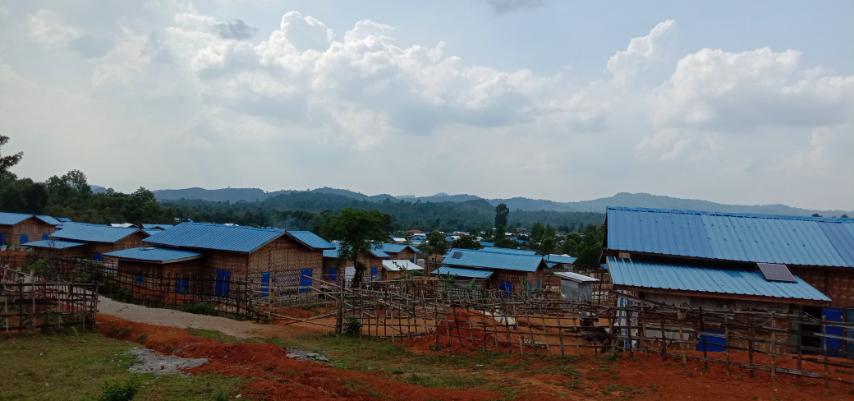|
|
|
Camp Closure Without Viable Plan
Challenges for Internally Displaced Persons (IDPs) from Northern Shan State
and Man Win Gyi area in Kachin State
A TNI Commentary
|
|
 IDP camp in Northern Shan State / Photo credit TNI IDP camp in Northern Shan State / Photo credit TNI |
|
|
|
|
Much news out of Myanmar these days is about how the war being waged by the military junta against people’s resistance since the coup is causing massive displacement of the population. According to UNOCHA, to date nearly 1 million people have been displaced by conflict since the start of the military coup last February 2021. The situation is devastating, and amidst and within this ongoing horror, it would be easy to overlook the many horrors and tragedies currently unfolding.
One especially urgent and terrible human drama now unfolding demands attention. In northern Shan State, about 14,000 people currently living in IDP camps who were previously displaced by armed conflict even before 2021 – most of them as much as 10 years ago – are now being threatened in a new way. Despite the intensification of armed conflict since the coup, the northern Shan IDPs are being told that the IDP camps will be closed down by the end of this year (and some even earlier) and that they must depart. No viable plan, no discussion: just an order to prepare to leave.
Armed conflict is what originally forced them to flee their customary lands and to settle into IDP camps so many years ago. They remain there because the conflict situation never improved substantially enough for them to leave, and indeed has deteriorated even more since the coup. Where is the logic in forcing any IDP camp to close down today? Where are the people who live in these camps supposed to go today? For sure, some people – military authorities, aid professionals etc. – will have something to say. But what about those most affected: what do the northern Shan IDPs themselves have to say?
In this commentary the people who were displaced a decade ago speak to us in their own words. We ought to listen to the IDPs’ words closely, rather than imagining that others know what is best today.
The IDPs in northern Shan State point to the ongoing conflict situation and argue that conditions needed for their safe and dignified return do not exist. They point to meetings that are taking place in preparation for forcible camp closures – meetings from which they are being excluded -- and argue that after ten years of being away from their customary lands and villages, much has changed and much has been destroyed by the military occupation. This means that careful planning and preparation are necessary to be able to “rebuild a safe and secure” physical and social environment for them and their children. They argue that any discussion of closing the camps must include them sincerely and meaningfully, because every decision made will affect them directly.
Surely, their practical experience and no-nonsense knowledge of their own situation in the camps and the situation on the ground is what should guide the actions of anyone who would want to help them in this hour of need. Listening to them, the warnings are clear: closing the camps in the manner that is being threatened is dangerous folly and will have tragic consequences. If anyone wants to help them, what they need is good preparation and planning, safe and secure places to go (whether original villages or elsewhere), and support for basic food and medicines. Their recommendations are not only reasonable and humane, but they are also actually the right thing to do according to the most basic international human rights and humanitarian principles.
|
|
|
|
|
|
|
ဘဝရှင်သန်ရပ်တည်ရန် သေချာသောအစီအစဉ်မရှိပဲ စခန်းပိတ်သိမ်းခြင်း
ရှမ်းပြည်နယ်မြောက်ပိုင်းနှင့် ကချင်ပြည်နယ် မန်းဝန်းကြီးဒေသမှ
ပြည်တွင်းနေရပ်စွန့်ခွာ စစ်ဘေးတိမ်းရှောင်သူများ လက်ရှိကြုံတွေ့နေရသော စိန်ခေါ်မှုများ
|
|
 IDP camp in Northern Shan State / Photo credit TNI
IDP camp in Northern Shan State / Photo credit TNI
|
|
|
လတ်တလော မြန်မာပြည်မှ ထွက်ပေါ်လာသမျှ သတင်းစကားအများစုမှာ အာဏာသိမ်းမှု နောက်ပိုင်း လူထုခုခံဆန်ကျင်မှုကို စစ်အာဏာရှင်များက စစ်ဆင်နွဲရာမှ ပေါ်ပေါက်လာသည့် ကြီးမားသည့် ရပ်ရွာစွန့်ခွါရွေ့ပြောင်းရမှုများအကြောင်းဖြစ်ပါသည်။ ကုလသမဂ္ဂလူသားချင်း စာနာထောက်ထားမှု ပူပေါင်းဆောင်ရွက်ရေးအဖွဲ့ (UNOCHA) ၏အဆိုအရ အာဏာသိမ်းသည့် ၂၀၂၁ ဖေဖေါ်ဝါရီလမှစ၍ ယနေ့အထိ လူတစ်သန်းနီးပါး ရပ်ရွာစွန့်ခွါ ရွေ့ပြောင်းခဲ့ကြရသည်။ အခြေအနေမှာ စိတ်ပျက်တုန်လှုပ်စရာကောင်းလှသည်။ အဆက်မပြတ်ဖြစ်နေသည့် ထိတ်လန့် စရာများကြားတွင် ကြေကွဲစရာဖြစ်ရပ်များကို အမှုမဲ့အမှတ်မဲ့ဖြစ်သွားရန်လည်း လွယ်ကူနိုင် ပါသည်။
လတ်တလောတွင် ဆိုးဝါးသည့်အနေအထားတချို့ကို အာရုံစူးစိုက်ရန် လိုအပ်နေပါသည်။ ၂၀၂၁ စစ်အာဏာသိမ်းမှု မဖြစ်မီကပင် ရှမ်းပြည်မြောက်ပိုင်းတွင် လက်နက်ကိုင်ပဋိပက္ခကြောင့် ရပ်ရွာ စွန့်ခွါရသူ လူ ၁၄,၀၀၀ တို့ရှိနေသည်။ အများစုက ယာယီခိုလှုံရာ စခန်းများတွင် နေကြရသည်မှာ ၁၀ နှစ်ခန့်ပင်ရှိပြီဖြစ်သည်။ ထိုပြည်သူတို့သည် ယခုအခါ ခြိမ်းခြောက်မှုအသစ် များကို ရင်ဆိုင်နေကြရသည်။ ပဋိပက္ခများ ပြင်းထန်လာနေသော်လည်း ရှမ်းပြည်မြောက်ပိုင်းရှိ ခိုလှုံရေး စခန်းများကို ယခုနှစ်အကုန်တွင် ( အချို့စခန်းများကို ထို့ထက်စော၍) ပိတ်သိမ်းခိုင်း လျက်ရှိ သည်။ ဆွေးနွေးညှိနှိုင်းမှုမရှိ၊ အခြားသော အစီအစဉ်မရှိပဲ ထွက်ခွါကြရမည်ဟု ပြောလာသော အမိန့်သာရှိသည်။
ပဋိပက္ခကြောင့် ပြည်သူတို့မှာ အစဉ်အလာ အခြေချရာဒေသများမှ ထွက်ပြေးလာကြရပြီး ယာယီစခန်းများတွင် နှစ်ရှည်လများနေထိုင်ကြရသည်။ အခြေအနေ ပိုကောင်းမလာသော ကြောင့်၊ အာဏာသိမ်းပြီးနောက်ပိုင်း အခြေအနေပို၍ပင် ဆိုးလာသောကြောင့် နေရပ်မပြန်နိုင်ကြ သူများဖြစ်သည်။ စခန်းများကို ယခုပိတ်သိမ်းနိုင်သည့် အကျိုးအကြောင်း ဘယ်မှာပါလဲ။ စခန်း တွင်နေကြသည့် စစ်ဘေးရှောင်တို့ မည့်သည့်နေရာကို သွားကြရမလဲ။ စစ်အာဏာပိုင်များ၊ ကူညီထောက်ပံရေးဝန်ထမ်းများစသည့် လူတချို့တွင် တစုံတရာပြောစရာများရှိနေနိုင်ပါသည်။ သို့ရာတွင် ကာယကံရှင် ရှမ်းမြောက်ပိုင်းမှ နေရပ်စွန့်ခွါပြည်သူများတွင် ဘာပြောစရာများရှိပါ သနည်း။
ယခုဝေဖန်သုံးသပ်ချက်မှာ ဆယ်စုနှစ်တစ်ခုကြာ နေရပ်ရွေ့ပြောင်းရသူတို့၏ စကားများဖြစ်
ပါသည်။ တခြားသူတို့ စိတ်ထင်ရာရာ ကောင်းနိုးရာရာ ပြောနေကြသည်များထက်ပို၍ သူတို့အသံ ကို သေချာနားထောင်သင့်ပါသည်။
ရှမ်းမြောက်မှ နေရပ်စွန်ခွါစခန်းများမှ ပြည်သူတို့က လက်ရှိပဋိပက္ခများကြားထဲတွင် လုံခြုံ သိက္ခာရှိစွာ နေရပ်ပြန်နိုင်မည့် အနေအထားများ မရှိကြောင်း ပြောပါသည်။ သူတို့ကိုယ်တိုင် ပါဝင်ခွင့်မရပဲ လုပ်ခဲ့ကြသည့် ရွေ့ပြောင်းပြည်သူနေထိုင်ရာစခန်းများ ပိတ်သိမ်းရေး အစည်း အဝေးများကို သူတို့က ညွှန်ပြပါသည်။ ဆယ်စုနှစ်တခုကျော် အစဉ်အလာရပ်ရွာ မြေယာများမှ စွန့်ခွါလာကြရပြီးနောက် အခြေအနေအများအပြားပြောင်းလဲခဲ့၊ စစ်တပ်သိမ်းပိုက်မှုတွင် ဖျက်ဆီး ခံခဲ့ရပြီးဖြစ်ပါသည်။ ထို့ကြောင့် ကလေးသူငယ်နှင့် ပြည်သူတို့အတွက် လုံခြုံဘေးကင်း သော လူမှုဘဝနှင့် ရုပ်ပိုင်းဆိုင်ရာတည်ဆောက်မှုများ စနစ်တကျစီမံ ပြင်ဆင်ရန်လိုအပ်နေပါ သည်။ သူတို့ဘဝများအပေါ် တိုက်ရိုက်သက်ရောက်မည့် စခန်းပိတ်သိမ်းရေး အစည်းဝေးများတွင် သူတို့အနေနှင့် ရိုးရိုးသားသား အဓိပ္ပါယ်ရှိရှိ ပါဝင်ခွင့်ရရန်လိုအပ်ပါသည်။
သူတို့၏ လက်တွေ့ဘဝအတွေ့အကြုံ အသိအမြင်များက သူတို့အတွက် အလိုအပ်ဆုံးဖြစ်နေ သည့် အချိန်တွင် ကူညီပေးမည့် မည်သူအတွက်မဆို လမ်းညွှန်ဖြစ်သင့်ပါသည်။ သူတို့စကားကို နားထောင်လျှင် လက်ရှိလုပ်နေသည့် ခြိမ်းခြောက်သည့် နည်းများဖြင့် စခန်းများ ပိတ်သိမ်းခြင်း သည် မိုက်မဲ၍ ကြေကွဲစရာ ဆိုးကျိုးများ ဖြစ်စေမည့် ကိစ္စဖြစ်ကြောင်း သိသာပါသည်။ သူတို့ လိုနေသည်မှာ ပြင်ဆင်စီမံမှုကောင်းကောင်း၊ လုံခြုံဘေးကင်းစွာသွားနိုင်မည့် နေရာ ( မူရင်း ရပ်ရွာ သို့မဟုတ် အခြားသောနေရာဖြစ်မည်)၊ အခြေခံစားသောက်ကုန်နှင့် ဆေးဝါးတို့ဖြစ်ပါသည်။ ထိုအချက်များကို ကူညီလိုသူတို့အနေနှင့်သိရမည်။ သူတို့တောင်းဆိုချက်များသည် အကြောင်း အကျိုးရှိ၍ လူသားဆန်ရုံသာမက နိုင်ငံတကာအခြေခံလူ့အခွင့်အရေးများအရ၊ လူသားချင်း စာနာထောက်ထားကူညီရေးစည်းမျဉ်းများအရ ဖြစ်ရမည့် ကိစ္စလည်း ဖြစ်ပါသည်။
|
|
|
|
|
|
|
|